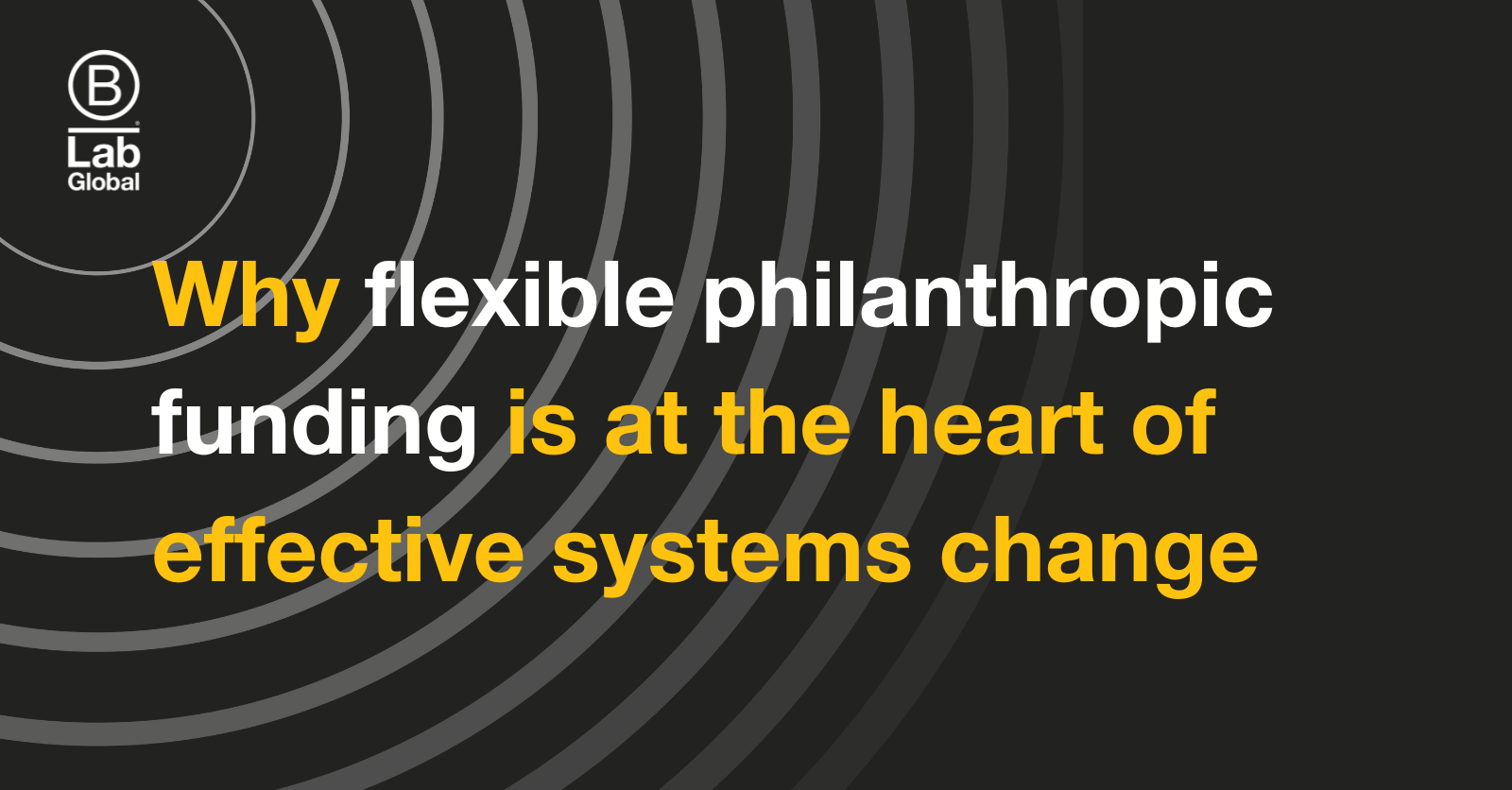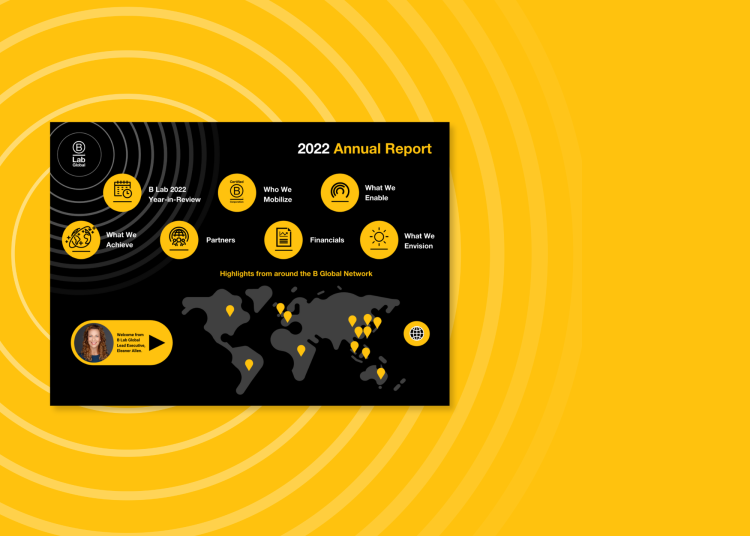Why flexible philanthropic funding is at the heart of effective systems change

For nearly 17 years, B Lab has worked toward transforming the economic system into one that works for all people, communities, and the planet. By setting standards for business performance, introducing and scaling the B Corp certification into a globally-recognized symbol of responsible business, and developing policies –– like the benefit corporation –– that enable stakeholder governance, B Lab is changing the behavior, culture, and structure of the business sector. And we’ve made major progress.
Today, the global community of B Corps stretches to more than 6,500 businesses in 89 countries and 161 industries. Benefit corporation or equivalent legislation has been passed in 8 countries, one Canadian province, and 44 US states plus DC and Puerto Rico, enabling more than 15,000 businesses to legally and permanently enshrine stakeholder governance into their corporate purpose. Our performance standards set the bar for environmental and social impact, transparency, and accountability and our narrative reaches millions more people than it did when we began in 2006. Our efforts to transform the business sector, in partnership with peers, policymakers, business leaders, and investors, are gaining momentum and our vision of an inclusive, equitable, and regenerative economy feels possible like never before.
Yet, a fairer, more just economic system is not inevitable.
Our focus is on the business sector. Though this is the largest piece of the global economy, it is not the only one. To truly change the economic system, we need to transform every facet of the private sector –– including philanthropy.
As a nonprofit organization, B Lab depends on philanthropic support to launch new programs, grow the global movement for an inclusive, equitable, and regenerative economy, and push the business sector to create greater impact for all their stakeholders, not just shareholders. We are deeply grateful for every philanthropic partner who has powered this work and joined us on this journey. Every dollar has been valuable in helping us reach our current position and spread the narrative of a stakeholder economy. Throughout it all, we have been especially grateful to the funders and donors who have provided multi-year, unrestricted support. This flexible funding has allowed B Lab to put resources where they are needed most to have the greatest impact on our mission and organization.
And now, as the global economy has once again entered a period of uncertainty, we are challenging philanthropic funders of all sizes to immediately shift to offering general operating or unrestricted support and increase their pay-outs. For years, nonprofit leaders have called, asked, and pleaded for more unrestricted funding and increased pay-outs. As a recent Inside Philanthropy headline stated loud and clear: the reasons that funders are still not giving unrestricted support are becoming “increasingly dubious.”
Over and over, it has been shown that providing general operating support or unrestricted funding improves equity, contributes to long-term nonprofit capacity and financial stability, and, importantly, demonstrates trust in nonprofit leaders (especially leaders who are Black, Indigenous, and People of Color).
In fact, findings from the first year of a three-year study to understand the impact of Mackenzie Scott’s giving round in July 2020 –– groundbreaking for the sheer volume of funding ($1.7 billion) and its unrestricted nature –– reconfirm these benefits. According to the study, these large, unrestricted grants helped recipient organizations significantly or moderately advance equity across five different dimensions (racial, economic, health, gender, and sexual orientation) and invest in partnerships that will scale this work. Meanwhile, 83% of surveyed leaders reported that these unrestricted gifts significantly strengthened their organization’s ability to achieve its mission and 90% indicated that the funding would improve their organization’s financial stability.
If philanthropic funders deeply care about these issues –– advancing equity, achieving social change, supporting nonprofit organizations’ longevity, and fostering effective collaboration –– the way forward is clear: provide large, unrestricted grant support.
Economic systems change is a long-term endeavor that won’t be solved by one-time, restricted grants. Given the scale and urgency of the world’s current crises, philanthropy can no longer just focus on what they are supporting, philanthropy must focus on how they are supporting. To have the greatest impact and truly effect systemic change, philanthropic funders and individuals have an opportunity much larger than just the money they give; they have the opportunity to embrace systemic changes themselves through their own operations and ways of working. Shifting to unrestricted giving and moving beyond the bare minimum pay-out requirements are two immediate changes that the philanthropic sector can make to advance their own strategies to achieve lasting social change.
Think of this: it is estimated that it would take $37 billion every year through 2030 to end a systemic problem like global hunger. In 2021, $234.06 billion was held by donor-advised funds and more than $1.3 trillion by private foundations, just in the US. If paid out, these funds alone could solve global hunger by 2030, with still more than $1 trillion remaining to address other deeply rooted systemic challenges around the world.
The world is coming through a period of tremendous tumult that –– for a moment –– seemed to catalyze true systems change for the economy, healthcare, racial justice, climate, and so much more. Yet, the promises that were made by politicians, businesses, and, yes, philanthropists, are fading. We applaud funders like the Ford Foundation that have integrated General Operating Support into their giving and The Initiative to Accelerate Charitable Giving that they are a part that advocates for charitable giving reform, including increased pay-outs; and we add our voice to the countless other organizations around the world calling for more philanthropic funders and donors to follow suit. Transforming the economic system is a deeply rooted, multi-generational goal. Achieving it will take trust, flexibility, and significantly greater philanthropic giving than project-restricted, short-term grants. B Lab and every other organization working toward a more inclusive, equitable, and regenerative economy –– especially organizations led by individuals from marginalized communities –– need multi-year general operating support. And if philanthropists and foundations are truly interested in that same vision, they will critically examine their own processes and giving and do what has been proven time and again to be best for the sector –– give general operating support.

Join us as we illustrate the stories from the numbers in our newly launched 2023 Annual Report